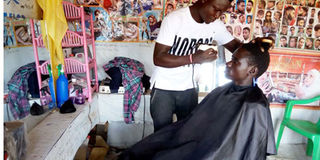Refugee banks on salon business

Muro Kasim Abibu Taban works on a customer at his salon in Bidi Bidi Refugee Settlement in Yumbe District. PHOTO BY ROBERT ELEMA
What you need to know:
Kasim Abibu Taban does not mind missing food rations thanks to the daily income from his salon business, Robert Elema writes.
Kasim Abibu Taban fled from South Sudan last year with nothing to feed his three children and wife.
Since the twenty six-year old left his business in South Sudan in November last year, he relies on food rations from United Nations’ World Food Programme and other refugee agencies.
But his business ideas did not die out. Taban has set up a salon in the settlement camp in Yumbe District to eke out a living.
Taban was lucky to exploit his skills after acquiring cash from an international non-governmental organisation - Save the Children.
‘’In the first phase of cash for work project, I was given Shs420,000 and in the second phase, I received Shs280,000. I used part of the money for domestic issues and I saved Shs480,000 to start the salon business. I was idle in the camp but now I can earn Shs30,000 per day from this business,” he said.
Taban charges his clients between Shs500 and Shs2,500 depending on the type of haircuts. He hopes to expand the business and employ some people to keep some money in his hands.
Taban does not mind missing the food rations thanks to the profitability of this business.
“I feel like I am a Ugandan now although my parents are in Juba. I want to utilise this opportunity by Save the Children to earn a living,” Taban said.
Save the Children’s Cash-for-work’ project supports refugees and host communities by providing temporary employment opportunities where they later open up different kinds of businesses in the settlement.
Some of these projects in the settlement include tree planting, road maintenance, garbage collection and rubbish pit construction.
There are more than 2 million South Sudanese refugees living in Uganda, fleeing a nearly four-year civil war that has split supporters of President Salva Kiir, a Dinka, against former Vice President Riek Machar, of the Nuer ethnic group.
Bidi-Bidi, which opened in August 2016. Bidi-bidi has about 285,000 South Sudan refugees as per the earlier registration.
Last year in December, Taban’s hope almost faded as his family would starved.
Mr Taban operates with a 200-watt solar panel that has transformed his livelihood at Bidi-Bidi refugee settlement.
Refugees in Bidi Bidi rely on rations from the United Nations’ World Food Programme. While some refugees sell a portion of their rations to afford basic necessities such as sugar, soap and other items, others capitalise on Save the Children’s ‘Cash for work’ project, where they are paid cash in exchange for their labour.
Similarly, Ms Joyce Konga a mother to four children, who migrated from South Sudan experienced difficult times with her family.
She now deals in assorted goods in one of the markets established within Ombaci camp. Ms Konga received Shs144,000 under the ‘Cash for work project and Shs284,000 for the business. She invested all this money in the business where she earns a daily income of between Shs10,000 and Shs15,000.
Speaking during the graduation ceremony for the beneficiaries recently, Mr Albert Okwai the acting manager for save the children said a total of 500 beneficiaries were supported under ‘Cash for work’ project, micro businesses, vocational support and village savings and Loan association who underwent vetting process.
Mr Okwai said 400 beneficiaries were able to get a total cash grant of Shs700,000 per person and 100 beneficiaries received Shs420,000 each as startup capital.




